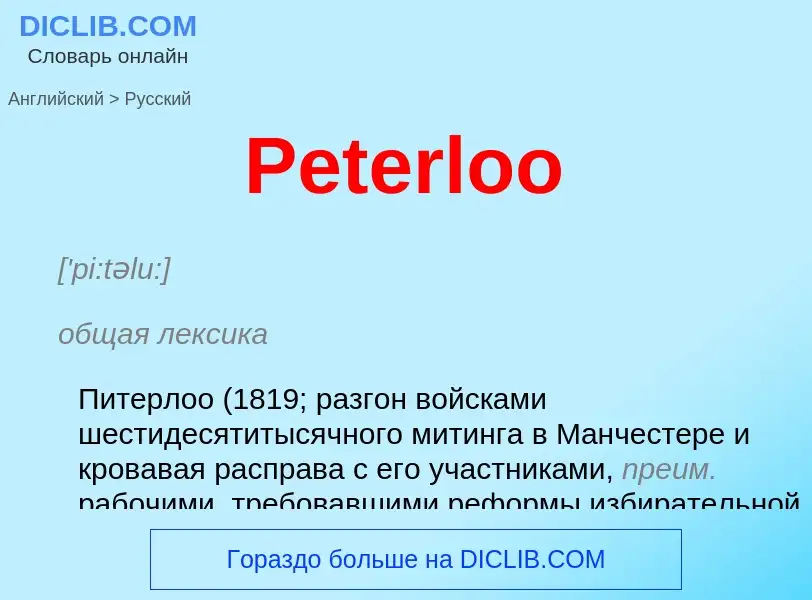Traducción y análisis de palabras por inteligencia artificial ChatGPT
En esta página puede obtener un análisis detallado de una palabra o frase, producido utilizando la mejor tecnología de inteligencia artificial hasta la fecha:
- cómo se usa la palabra
- frecuencia de uso
- se utiliza con más frecuencia en el habla oral o escrita
- opciones de traducción
- ejemplos de uso (varias frases con traducción)
- etimología
Peterloo - traducción al Inglés
['pi:təlu:]
общая лексика
Питерлоо (1819; разгон войсками шестидесятитысячного митинга в Манчестере и кровавая расправа с его участниками, преим. рабочими, требовавшими реформы избирательной системы; 11 человек было убито, ок. 600 ранено)
полное выражение
Peterloo massacre; слово образовано по аналогии с Waterloo, поскольку войска, сражавшиеся в битве при Ватерлоо, тж. участвовали в этой расправе; первая часть - по названию места проведения митинга Сент-Питерз-Филдз [St Peter's Fields]
[,mæntʃɪstə'mæsəkə]
общая лексика
Манчестерская резня
синоним
Wikipedia

The Peterloo Massacre took place at St Peter's Field, Manchester, Lancashire, England, on Monday 16 August 1819. Fifteen people died when cavalry charged into a crowd of around 60,000 people who had gathered to demand the reform of parliamentary representation.
After the end of the Napoleonic Wars in 1815, there was an acute economic slump, accompanied by chronic unemployment and harvest failure due to the Year Without a Summer, and worsened by the Corn Laws, which kept the price of bread high. At that time, only around 11 percent of adult males had the vote, very few of them in the industrial north of England, which was worst hit. Reformers identified parliamentary reform as the solution, and a mass campaign to petition parliament for manhood suffrage gained three-quarters of a million signatures in 1817 but was flatly rejected by the House of Commons. When a second slump occurred in early 1819, radical reformers sought to mobilise huge crowds to force the government to back down. The movement was particularly strong in the north-west, where the Manchester Patriotic Union organised a mass rally in August 1819, addressed by well-known radical orator Henry Hunt.
Shortly after the meeting began, local magistrates called on the Manchester and Salford Yeomanry to arrest Hunt and several others on the platform with him. The Yeomanry charged into the crowd, knocking down a woman and killing a child, and finally apprehended Hunt. Cheshire Magistrates' chairman William Hulton then summoned the 15th Hussars to disperse the crowd. They charged with sabres drawn, and contemporary accounts estimated that between nine and seventeen people were killed and 400 to 700 injured in the ensuing confusion. The event was first labelled the "Peterloo massacre" by the radical Manchester Observer newspaper in a bitterly ironic reference to the bloody Battle of Waterloo which had taken place four years earlier.
Historian Robert Poole has called the Peterloo Massacre "the bloodiest political event of the 19th century in English soil", and "a political earthquake in the northern powerhouse of the industrial revolution". The London and national papers shared the horror felt in the Manchester region, but Peterloo's immediate effect was to cause the government to pass the Six Acts, which were aimed at suppressing any meetings for the purpose of radical reform. It also led indirectly to the foundation of the Manchester Guardian newspaper. In a survey conducted by The Guardian in 2006, Peterloo came second to the Putney Debates as the event from radical British history that most deserved a proper monument or a memorial.
For some time, Peterloo was commemorated only by a blue plaque, criticised as being inadequate and referring only to the "dispersal by the military" of an assembly. In 2007, the city council replaced the blue plaque with a red plaque referring to "a peaceful rally" being "attacked by armed cavalry" and mentioning "15 deaths and over 600 injuries". In 2019, on the 200th anniversary of the massacre, Manchester City Council inaugurated a new Peterloo Memorial by the artist Jeremy Deller, featuring eleven concentric circles of local stone engraved with the names of the dead and the places from which the victims came.



![Manchester Central]] in 2019 Manchester Central]] in 2019](https://commons.wikimedia.org/wiki/Special:FilePath/Peterloo Memorial (geograph 6240951).jpg?width=200)
![Hunt's]] arrest by the constables Hunt's]] arrest by the constables](https://commons.wikimedia.org/wiki/Special:FilePath/Peterloo massacre dreadful scene at Manchester.jpg?width=200)
![Hundred of Salford]]", published by the magistrates the day after the massacre Hundred of Salford]]", published by the magistrates the day after the massacre](https://commons.wikimedia.org/wiki/Special:FilePath/Peterloo poster.jpg?width=200)
![Middleton]] to St Peter's Field. Following his [[imprisonment]] for "inciting a riot", Bamford emerged as a prominent voice for radical reform. Middleton]] to St Peter's Field. Following his [[imprisonment]] for "inciting a riot", Bamford emerged as a prominent voice for radical reform.](https://commons.wikimedia.org/wiki/Special:FilePath/Samuel Bamford.png?width=200)
![Caricature by [[George Cruikshank]] depicting the charge upon the rally Caricature by [[George Cruikshank]] depicting the charge upon the rally](https://commons.wikimedia.org/wiki/Special:FilePath/The Massacre of Peterloo.jpg?width=200)
